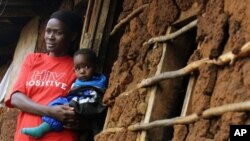The U.N. children's agency, UNICEF, and the Kenyan government have announced a new approach to prevent the transmission of HIV from mothers to their babies. The program launch in Kenya marks the beginning of a phased implementation in three other African countries.
The initiative is geared toward reaching pregnant women who have tested positive for HIV, but who may not seek additional medical help following their diagnosis.
At the core of the initiative is a take-home box called "the Mother-Baby Pack," that contains all the anti-retroviral drugs and antibiotics needed to protect the health of both the mother and the child. The medicines are pre-measured and packaged - ideal for poor women who cannot afford to make repeated visits to a clinic for drugs and preventive care.
The pack was developed by UNICEF in collaboration with the World Health Organization, USAID, Elizabeth Glaser Pediatric AIDS Foundation and other partners. The idea was inspired by healthcare workers in Lesotho, who gave HIV-positive pregnant women plain paper bags filled with pre-measured drugs along with instructions on how to administer them during and after pregnancy. The experiment proved highly effective at stopping HIV transmission from mother to child.
The "Mother-Baby Pack" is now part of the Kenyan government's existing Maisha Initiative for creating zones free of mother-to-child HIV transmission.
Maisha, which means "life" in Swahili, is a program that aims to eliminate mother-to-child transmission of HIV and pediatric AIDS in two provinces hardest hit by AIDS - Nyanza and the Rift Valley. Nyanza's disease prevention and control officer, Dr. Peter Okoth, says the need for the "Mother-Baby Pack" in his province cannot be overstated.
"[In] Kenya, the prevalence rate for HIV is around seven percent," Dr. Okoth. "But for Nyanza, it is the highest in Kenya at around 15 percent of the population aged 15 to 49 years [old]. So, it is critical that we focus on Nyanza to reduce HIV transmission."
In recent years, healthcare workers in Kenya have made progress in providing services to prevent mother-to-child transmission of the virus. But UNICEF says many women, especially in rural areas, still do not have access to the services and some 22,000 infants are born infected with HIV every year in the country.
It estimates that without treatment, about half of all children born with HIV die before their second birthday.
Clinics and hospitals in Nyanza and the Rift Valley will distribute "Mother-Baby Packs" to HIV-infected women, who do not yet require treatment for their own health. UNICEF says the agency and its partners will carefully monitor the program to ensure that it is working and that the quality of supply and distribution is sound.
If all goes well in Kenya, the packs are scheduled to be introduced in Cameroon, Lesotho, and Zambia in the coming months.
Kenya, UN Take New Approach to AIDS Babies















